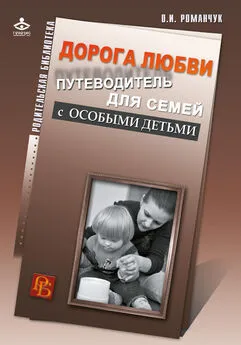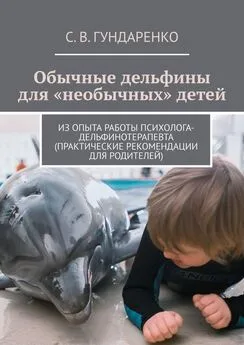Милтон Селигман - Обычные семьи, особые дети
- Название:Обычные семьи, особые дети
- Автор:
- Жанр:
- Издательство:неизвестно
- Год:неизвестен
- ISBN:нет данных
- Рейтинг:
- Избранное:Добавить в избранное
-
Отзывы:
-
Ваша оценка:
Милтон Селигман - Обычные семьи, особые дети краткое содержание
Семья ребенка с нарушениями развития ничем принципиально не отличается от любой другой семьи. Но появление такого ребенка - сложнейшее испытание, при котором семья нуждается в объективной информации, поддержке значимых людей, социальных ресурсах и квалифицированной помощи специалистов. Системный подход, применяемый авторами, позволяет им рассмотреть влияние особого ребенка на каждого члена семейной системы и выделить стадии адаптации к травмирующим обстоятельствам. Члены семьи, справившиеся с тяжелыми переживаниями, эмоционально принявшие ребенка с нарушениями развития, отмечают, что, несмотря на многочисленные трудности, в их жизни произошли положительные изменения: семья стала более сплоченной, появилось больше взаимной любви и заботы, сами члены семьи личностно изменились, стали сильнее.
Книга предназначена психологам, педагогам, дефектологам, организаторам государственной социальной защиты и реабилитационно-образовательного сопровождения людей с особыми потребностями, социальным адвокатам и студентам профильных факультетов. Она также будет полезна родным особых детей и всем, кто интересуется вопросами помощи этим детям.
Обычные семьи, особые дети - читать онлайн бесплатно ознакомительный отрывок
Интервал:
Закладка:
Shurka, E., & Florian, Y (1983). A study of Israeli Jewish and Arab parental perceptions of their disabled children. Journal of Comparative Family Studies, 14, 367-375.
Siegel, В., & Silverstein, S. (1994). What about me?: Growingup with a developmentally disabled sibling. New York: Plenum.
Siller, J. (1984). Personality and attitudes toward physical disabilities. In G. J. Golden (Ed.), Current topics in rehabilitation psychology (pp. 201-227). New York: Grune & Stratton.
Simeonsson, R. J., & Bailey, D. B. (1986). Siblings of handicapped children. In J. J. Gallagher & W. Vietze (Eds.), Families of handicapped persons (pp. 67-77). Baltimore: Brookes.
Simpson, R. L. (1990). Conferencing parents of exceptional children. Austin, TX: Pro-Ed.
Simpson, R. L. (1996). Working with parents and families of exceptional children and youth. Austin, TX: Pro-Ed.
Singer, G. H. S., & Powers, L. E. (1993). Families, disability, and empowerment. Baltimore: Brookes.
Skrtic, Т., Summers, J., Brotherson, M. J., & Turnbull, A. (1984). Severely handicapped children and their brothers and sisters. In J. Blacher (Ed.), Severely handicapped young children and their families: Research in review (pp. 215-246). Orlando, FL: Academic Press.
Sloman, M. D., Springer, S., & Vachon, M. (1993). Disordered communication and grieving in deaf member families. Family Process, 32, 171-181.
Sloper, P., & Turner, S. (1991). Parental and professional views of the needs of families with a child with severe physical disability. Counseling Psychology Quarterly, 4, 323-330.
Smith, K. (1981). The influence of the male sex role on discussion groups for fathers of exceptional children. Michigan Personnel and Guidance Journal, 12, 11-17.
Sollenberger, E. R. (1974). Care and education of crippled children in the United States. New York: Arno.
Solnit, A. J., & Stark, M. H. (1961). Mourning and the birth of a defective child. Psychoanalytic Study of the Child, 16, 523-537.
Sommers-Flanagan, J., & Sommers-Flanagan, R. (1993). Foundations of therapeutic interviewing. Boston: Allyn & Bacon.
Sonnek, I. M. (1986). Grandparents and the extended family of handicapped children. In R. R. Fewell & P. F Vadasy (Eds.), Families of handicapped children (pp. 99-120). Austin, TX: Pro-Ed.
Sontag, J. G., & Schacht, R. (1994). An ethnic comparison of parent participation and information needs in early intervention. Exceptional Children, 60, 422-433.
Sorenson, J. (1974). Biomedical innovation, uncertainty, and doctor-patient interaction. Journal of Health and Social Behavior, 15, 366-374.
Sosnowitz, B. G. (1984). Managing parents on neonatal intensive care units. Social Problems, 31, 390-402.
Sourkes, В. M. (1987). Siblings of a child with a life-threatening illness. Journal of Children in Contemporary Society, 19, 159-184.
Spano, S. L. (1994). The miracle of Michael. In R. B. Darling & M. I. Peter (Eds.), Families, physicians, and children with special health needs: Collaborative medical education models (pp. 29-50). Westport, GT: Auburn House.
Spector, R. E. (1979). Cultural diversity in health and illness. New York: Appleton-Century-Crofts.
Spock, В. M. (1946). The common sense book of baby and child care. New York: Duell, Sloan, Pearce.
Spock, В. M. (1957). Baby and child care. New York: Pocket Books.
Spock, B. M., & Rothenberg, M. B. (1985). Baby and child care. New York: Dutton.
Staples, R. (1976). The black American family. In G. H. Mindel & R. W. Habenstein (Eds.), Ethnic families in America: Patterns and variations (pp. 221-247). New York: Elsevier.
Stax, Т. E., & Wolfson, S. D. (1984). Life-cycle crises of the disabled adolescent and young adult. In R. W. Blum (Ed.), Chronic illness and disabilities in childhood and adolescence (pp. 47-57). New York: Grune & Stratton.
Stehower, J. (1968). The household and family relations of old people. In E. Shames, D. Townsend, D. Wedderbrunn, H. Friis, P. Michoj, & J. Stehower (Eds.), Old people in three industrial societies (pp. 177-226). New York: Atherton.
Stein, R. G. (1983). Hispanic parents' perspectives and participation in their children's special education program: Comparisons by program and race. Learning Disability Quarterly, 6, 432-439.
Stillman, R L., Sabers, D. L., & Redfield, D. L. (1977). Use of trained mothers to teach interviewing skills to first-year medical students: A follow-up study. Pediatrics, 60, 165-169.
Stone, N. W., & Chesney, В. H. (1978). Attachment behaviors in handicapped infants, Mental Retardation, 16, 8-12.
Stoneman, Z., & Berman, R W. (1993). The effects of mental retardation, disability, and illness on sibling relationships. Baltimore: Brookes.
Stoneman, Z., Brody, G. H., Davis, G. H., Crapps, J. M., & Malone, D. M. (1991). Ascribed role relations between children with mental retardation and their younger siblings. American Journal on Mental Retardation, 95, 537-550.
Stonequist, E. V (1937). The marginal man: A study in personality and culture conflict. New York: Scribners.
Stotland, J. (1984, February). Relationship of parents to professionals: A challenge to professionals. Journal of Visual Impairment and Blindness, 69-74.
Streib, G., & Beck, R. (1981). Older families: A decade review. Journal of Marriage and the Family, 42, 937-956.
Strong, P. M. (1979). The ceremonial order of the clinic: Parents, doctors, and medical bureaucracies. London: Routledge & Kegan Paul.
Sudarkasa, N. (1981). Interpreting the African heritage in Afro-American family organization. In H. P. McAdoo (Ed.), Black families (pp. 37-53). Beverly Hills: Sage.
Suelzle, M., & Keenan, V (1981). Changes in family support networks over the life cycle of mentally retarded persons. American Journal of Mental Deficiency, 86, 267-274.
Svarstad, B. L., & Lipton, H. L. (1977). Informing parents about mental retardation: A study of professional communication and parent acceptance. Social Science and Medicine, 11, 645-651.
Tallman, I. (1965). Spousal role differentiation and the socialization of severely retarded children. Journal of Marriage and the Family, 27, 37-42.
Tartar, S. B. (1987). Traumatic head injury: Parental stress, coping style and emotional adjustment. Unpublished doctoral dissertation, University of Pittsburgh.
Telford, G. W., & Sawrey, J. M. (1977). The exceptional individual (3rd ed.). Englewood Cliffs, NJ: Prentice-Hall.
Tew, В., & Lawrence, K. (1975). Mothers, brothers and sisters of patients with spina bifida. Developmental Medicine and Child Neurology, 75 (Suppl. 29), 69-76.
Tew, B. J., Lawrence, K. M., Payne, H., & Rawnsley, K. (1977). Marital stability following the birth of a child with spina bifida. British Journal of Psychiatry, 131, 79-82.
Thibodeau, S. M. (1988). Sibling response to chronic illness: The role of the clinical nurse specialist. Issues in Comprehensive Pediatric Nursing, 11, 17-28.
Tolson, T E J., & Wilson, M. N. (1990). The impact of two– and three-generational black family structure on perceived family climate. Child Development, 61, 416-428.
Travis, G. (1976). Chronic illness in children: Its impact on child and family. Stanford, CA: Stanford University Press.
Trevino, E (1979). Siblings of handicapped children. Social Casework, 60, 488-493.
Tritt, S. G., & Esses, L. M. (1988). Psychological adaptation of siblings of children with chronic medical illness. American Journal of Orthopsychiatry, 58, 211-220.
Trivette, G. M., & Dunst, G. J. (1982). Proactive influences of social support in families of handicapped children. Unpublished manuscript.
Turk, D. С, & Kerns, R. D. (1985). Health, illness and families: A life-span perspective. New York: Wiley.
Turnbull, A. P., Brotherson, M. J., & Summers, J. A. (1985). The impact of deinstitutionalization on families: A family systems approach. In R. H. Bruininks (Ed.), Living and learning in the least restrictive environment (pp. 115-152). Baltimore: Brookes.
Turnbull, A. P., Patterson, J. M., Behr, S. K., Murphy, D. L., Marquis, J. G., & Blue-Banning, M. J. (1993). Cognitive coping, families, and disability. Baltimore: Brookes.
Turnbull, A. P., Summers, J. A., & Brotherson, M. J. (1986). Family life cycle: Theoretical and empirical implications and future directions for families with mentally retarded members. In J. J. Gallagher & P. M. Vietze (Eds.), Families of handicapped persons (pp. 45-65). Baltimore: Brookes.
Turnbull, A. P., & Turnbull, H. R. (1986). Families, professionals, and exceptionality. Columbus, OH: Merrill.
Turnbull, A. P., & Turnbull, H. R. (1990). Families, professionals, and exceptionality (2nd ed.). Columbus, OH: Merrill.
Turnbull, A. R, & Turnbull, H. R., Ill (in press). An analysis of self-determination within a culturally responsive family systems perspective: Balancing the family mobile. In J. Sowers (Ed.), Making our way: Promoting self-competence among children and youth with disabilities. Baltimore: Brookes.
Turnbull, H. R., & Turnbull, A. P. (Eds.). (1985). Parents speak out: Then and now. Columbus, OH: Merrill.
United States Commission on Civil Rights. (1986). Protection of handicapped newborns: Hearing held in Washington, DC, June 26-21, 1986 (Vol. II). Washington, DC: U.S. Government Printing Office.
University of Pittsburgh Office of Child Development. (1991). Black families: An inquiry into the issues. Developments, 5(1), 5-8.
Upshur, С. C. (1982). Respite care for mentally retarded and other disabled populations: Program models and family needs. Mental Retardation, 20, 2-6.
Upshur, С. C. (1991). Families and the community service maze. In M. Seligman (Ed.), The family with a handicapped child [2nd ed., pp. 91-118). Boston: Allyn & Bacon.
Vadasy, P. F (1986). Single mothers: Asocial phenomenon and population in need. In R. R. Fewell & P. F Vadasy (Eds.), Families of handicapped children (pp. 221-249). Austin, Texas: Pro-Ed.
Vadasy, P. F, & Fewell, R. R. (1986). Mothers of deaf-blind children. In R. R. Fewell & R F Vadasy (Eds.), Families of handicapped children (pp. 121-148). Austin, TX: Pro-Ed.
Vadasy, P. Е, Fewell, R. R., & Meyer, D. J. (1986). Grandparents of children with special needs: Insights into their experiences and concerns. Journal of the Division for Early Childhood, 10, 36-44.
Vadasy, R E, Fewell, R. R., Greenberg, M. Т., Desmond, N. L., & Meyer, D. J. (1986). Follow-up evaluation of the effects of involvement in the fathers program. Topics in Early Childhood Education, 6, 16-31.
Vadasy, P. E, Fewell, R. R., Meyer, D. J., & Greenberg, M. T. (1985). Supporting fathers of handicapped young children: Preliminary findings of program effects. Analysis and Intervention in Developmental Disabilities, 5, 125-137.
Varekamp, M. A., Suurmeijer, R, Rosendaal, E R., Dijck, H., Uriends, A., & Briet, E. (1990). Family burden in families with a hemophilic child. Family Systems Medicine, 8, 291-301.
Vasta, R. (1982). Strategies and techniques of child study. New York: Academic Press.
Vincent, L. J., & Salisbury, G. L. (1988). Changing economic and social influences on family involvement. Topics in Early Childhood Special Education, 12, 48-59.
Читать дальшеИнтервал:
Закладка:










